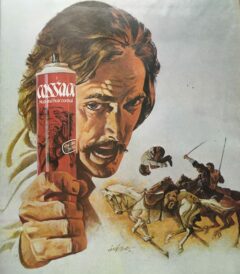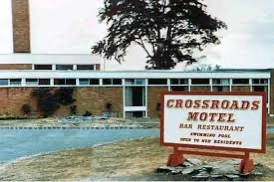
Ridiculed for its low production values and described as ‘distressingly popular’, Crossroads continues to live in the memory
In the 1968 film The Killing of Sister George the central character, played by the great Beryl Reid, of a hugely successful soap opera is killed off at the height of her popularity despite her character being greatly loved by the viewing public and her hordes of adoring fans. Of course, this couldn’t happen in real life, could it? You already know where I’m going with this, and, as we all know, this did happen to the star of the 60s and 70s daily serial (I refuse to use that Americanism ‘Soap Opera‘) Crossroads, the sainted Noele Gordon/ Meg Richardson in 1981.
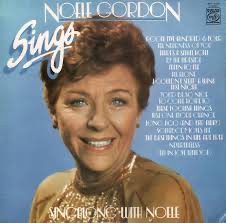
After winning the TV Times Most Popular TV Personality a staggering 8 times, being the only character on permanent contract in its history, being the main talismanic character for 17 years and generally seen as the Crossroads matriarch who, Boudicca-like, drove the chariot of tea-time drama past the slings and arrows of TV criticism, ‘Nolly’ was unceremoniously dumped by new producer William Smethurst in 1981. Referred to as Butcher Bill by some (mainly her), he had been installed to revive the programme’s flagging fortunes in the same way he had done with the The Archers previously. And like the trooper and consummate professional she was, Noele accepted the inevitable, took it on the chin and walked off into the West Midlands sunset to maybe check into a new showbiz three star motel (with swimming pool).
And if you believe that, you’ll believe anything.
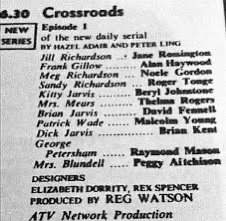
Darts commentator Sid Waddell when describing a particularly tense darts encounter once roared, ‘You might get Shakespeare on BBC 2 but you can’t beat this for drama!’ He could just have inserted ‘Crossroads on ITV’ instead of ‘Shakespeare on BBC‘ and have achieved the same hyperbolic effect. It’s fair to say since its grand opening in 1964 when Jill Richardson picked up the phone in reception and said. ‘Crossroads Motel. Can I help you?‘ that it’s seen more than its fair share emotional turmoil, in front of and behind the cameras. Bigamy, international terrorism, Soviet spying, hauntings, industrial sabotage, alcoholism and, obviously, attempted murder have all darkened the reception of the Crossroads Motel, King’s Oak (with swimming pool).
Some uncharitable commentators at the time saw Crossroads as ‘a byword for cheap production values‘, though many cast members from the show have denied that it was that bad. Wobbly sets and fluffed lines have become synonymous with the show, however, and, to be fair, the 5 days a week 52 weeks a year run was, to say the least, punishing. Retakes were rare and it’s hats off to most of these actors that were able to deliver their lines reasonably well in one take. In all the years I watched Crossroads I don’t remember the amazing Nolly fluff or mistime a single line, which says much about her ability and professionalism, although that can’t be said for all. Crossroads production values were highlighted again some years after its demise when the brilliant and sadly missed Victoria Wood wrote Acorn Antiques, which was obviously based on the motel. Although very, very funny it was also an affectionate tribute and Victoria Wood must have been a fan to have been so accurate in her depiction of aspects of the show.
Created by writers Hazel Adair and Peter Ling, who had been behind the successful early sixties serial about a women’s magazine Compact, which incidentally starred Ronnie Allen, a later stalwart of Crossroads as Manager ‘Dishy’ David Hunter, Crossroads began in 1964. Adair had also written for Emergency Ward 10 and radio blockbuster Mrs Dale’s Diary but in her latter career, interestingly, she turned her hand to writing soft-porn films with, of all people, ITV wrestling commentator and former DJ, Kent Walton. Early 70s sexploitation films such Keep It Up Downstairs (see Jack Wild: The Kid Who Had It All) were amongst the fruits of their endeavours. Now, you have to admit. That’s interesting!
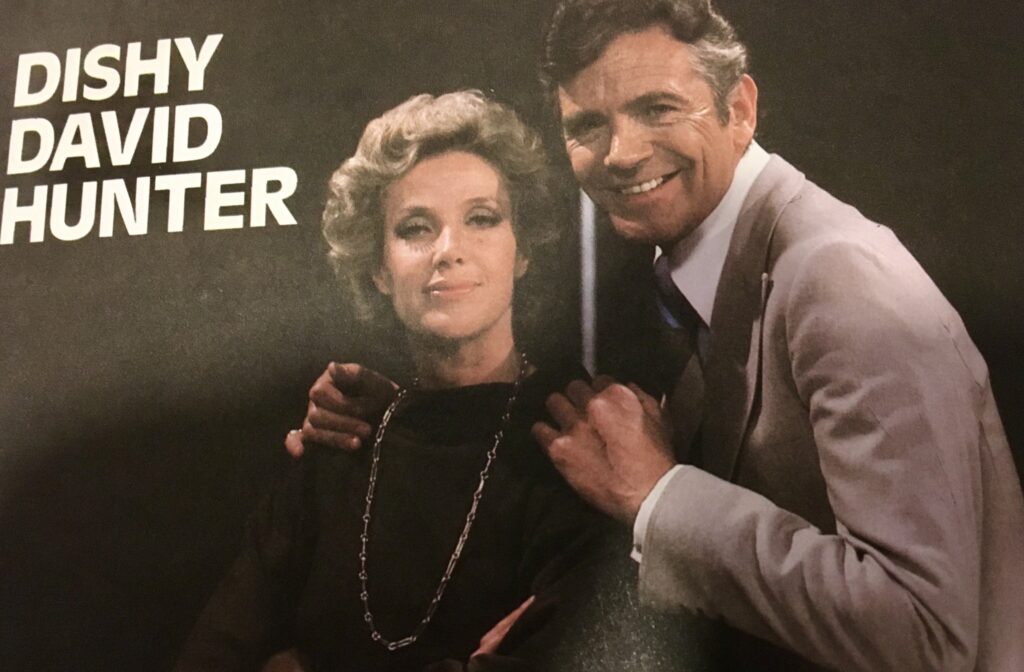
Peter Ling‘s CV was a little more prosaic but no less interesting. Having written stories for legendary 60s comic The Eagle, he also wrote scripts for a range of solid 60s and 70s TV series including Dixon of Dock Green, No Hiding Place and The Avengers (see The Avengers: Quirk, Strangeness and Charm (and bags of style). For me though, his most notable achievement was writing The Mind Robber, a superbly clever story from the Patrick Troughton Dr Who years. A truly surreal and hugely creative tale, it was a shining example of a time when Dr Who was still challenging and inventive in its storytelling, despite its Crossroads-like sets. And clearly light years away from the Crossroads Motel, although Meg, without doubt, did have some Time Lord qualities.
The closing sequence of Crossroads is, for people of a certain age, the most familiar theme of the 60s and 70s. Even if you didn’t watch the programme. Composed by easy-listening virtuoso and pop genius Tony Hatch (see Tony Hatch: Composer Of The Soundtrack For The 60s And 70s) with the ever-so-familiar title credits sliding up and down and from the sides (a bit like a crossroads, geddit?), the music had the required element of urgency and pathos which complimented the emotionally charged ending to that particular episode (and it was always emotionally charged), right down to the final glissando on the harp which usually accompanied a 3 second close up on the face of the featured distraught or sometimes wistful character (..and just hold it there please, Vera…………annnnnnnddddd cut! Lovely darling!).
In 1974 Paul McCartney and Wings included a version of the Crossroads theme on their album Venus and Mars (nice little earner for Tony Hatch). In the mid-70s the producers of Crossroads decided to use this version occasionally at the end of particularly sentimental episodes as the Wings version was a little more poignant and sensitive than the original. This decision met with mixed opinions from the legions of Crossroadsaratti but the producers stuck with it to the end. Although I liked Wings at the time it just didn’t quite do it for me in the way Hatch’s original did. But, over the years, it has become synonymous with the later incarnation of Crossroads, but stormier waters than this were yet to be negotiated.
For most of its 24 year run, Crossroads pretty much survived on three main sets: Meg’s office/ sitting room, the kitchen and the motel reception. The Crossroads motel reception had the distinction of having the smallest bar in hospitality history. Barely large enough to fit barman cum postman Vince Parker behind it, it consisted of about four optics, a solitary beer tap and half a dozen bottles on a top shelf which didn’t change in 20 years. It’s fair to say seating was limited. One bar stool plus a chair/ stool combo next to the reception entrance doorway. Someone sitting in these seats would have tripped up anyone rushing through the front door in a highly agitated fashion. Which characters did regularly.
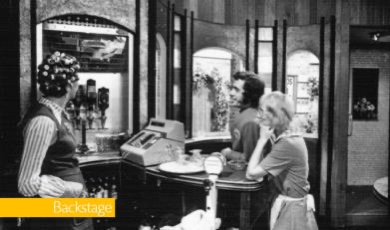
Literally hundreds of actors passed through the Motel reception. Some of them quite well-known and some (but not many) who went on to bigger and better things. But as well as Noele Gordon a few became synonymous with the programme. For example:
- Roger Tonge (Sandy Richardson): Roger was involved in Am-dram when he wandered into ATV Studios one day and asked if they had any jobs. He was directed upstairs to where they just happened to be auditioning for cast members for a new daily serial about to be going into production called Crossroads. He strolled in, they said, ‘You’ll do’ and behold, Sandy Richardson was born. Sandy was in Crossroads from episode 1 and when his health began fail some years later the writers manufactured a scenario where he was injured in a car crash, partly paralysed and was confined to a wheel chair. He was the first disabled character ever in a daily serial (Chief Ironside was a few years down the line). Eventually his condition worsened and he sadly died in 1981. Bizarrely his death was never acknowledged in the show at the time. When mentioned he was always ‘at the cafeteria’, which became something of a euphemism for a character who had gone to that great motel reception area in the sky. Eventually Jill mentioned him in words that suggested he was no longer with us, but that was nearly a year later.
- Susan Hanson (Diane Lawton): She first appeared in the excellent 1964 Dave Clark Five vehicle Catch Us If You Can directed by a young John Boorman, joined Crossroads in 1966 and was killed off in 1987. She became famous as village idiot Benny Hawkin‘s guardian after she discovered him working on her Uncle Ed’s farm. Miss Doy-Ann had an interesting private life. Having been married for a short time to rock DJ Tommy Vance in the 60s, she met singer and former wild-man of rock Carl Wayne when he had a small part in Crossroads in 1973. They married in 1974 and stayed together until he died at the criminally young age of 61. Carl Wayne was lead singer of brilliant 60s band The Move. With Roy Wood they had a string of hits including Fire Brigade, I Can Hear The Grass Grow and Tonight. He was also the first singer to be broadcast on Wonderful Radio One in 1967 when Tony Blackburn’s first record was Flowers In The Rain ( See The Moronic World of 70s Radio One DJs). On leaving The Move he became something of a housewives’ choice appearing on a lunchtime music show with Geraldo’s Big Band singing standards and songs from the musicals. He also sang the memorable Tony Hatch composed theme tune to post-Op Knocks ( see Opportunity Knocks!) talent show New Faces in the 1980s, You’re A Star. Recently Sue made that soap opera crossover and had a role in Coronation Street appearing opposite her ‘partner in crime’ during her 60s Crossroads period Sue Nicholls who played waitress Marilyn Gates.
- Shughie McPhee (Angus Lennie) joined in 1974. His CV is impressive having appeared in Tunes of Glory, 633 Squadron, The VIPs with Richard Burton and his most well-known role as ‘The Mole‘ in The Great Escape. It’s fair to say that his film career was crashing and burning, a bit like that plane he was in in 633 Squadron when Crossroads came calling but he made that part of Head Chef Shughie McPhee his own.
- Amy Turtle played by Ann George joined the cast in 1965 and was written out in 1976. In true Crossroads style Amy went to visit relatives in the US and she was never referred to in the show again. She wasn’t even referred to as being ‘in the cafeteria‘ a la Sandy. But was she bitter? Damn right she was. She was photographed by that great champion of the oppressed The Sun newspaper shaking her fists outside the ATV studios. In an interview around the same time she revealed how she’d been shunned by the cast after she left and how hard done by she’d been by the producers and even Noele Gordon herself! Excellent stuff. One would think there was no way back after that, but you’d be wrong. She made a triumphant return in 1987 for a short time. It was Amy Turtle that Victoria Wood based the legendary Mrs Overall of Acorn Antiques on, and, not surprisingly, Julie Walters, who played Mrs Overall so brilliantly, came from the same West Midlands town as Amy, Smethwick. Fancy that!
- Benny Hawkins played by Paul Henry arguably became the most famous Crossroads character after Meg Richardson. Taken under her wing by Miss Doy-Ann, Benny was employed by the motel as a handyman. His tragic 1978 romance with tempestuous gypsy girl Maureen Flynn who was knocked off her bike and killed on the morning of their wedding (what rotten luck) struck a chord with the viewing public. But wasn’t she on her way to meet Pat, the dodgy gypsy and Benny’s love rival? Hmmm. Poor Benny was inconsolable. He even had a hit single about it. Benny’s Theme was not so much a song as a monologue where he mopes about his lost love and how his life has changed forever. To paraphrase Oscar Wilde writing about the death of Little Nell in The Old Curiosity Shop, ‘One must have a heart of stone to listen to Benny’s Theme without laughing.’ British soldiers during the Falklands War even referred to Falkland Islanders as ‘Bennies’, such was his influence. In later years it was revealed that Ronnie Barker had suggested Henry to play Lennie Godber in Porridge, the part eventually going to Richard Beckinsale. Bet he was pissed off about missing out on that one.
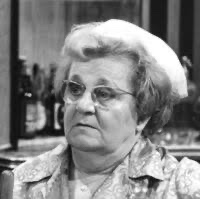
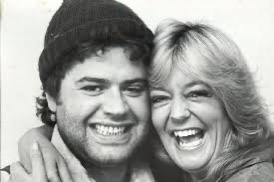
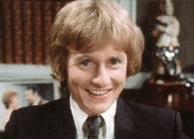
There are many other weird and wonderful characters that could be discussed here but with literally hundreds passing through King’s Oak it could take a while, but I’m giving one last small nod to the hordes of extras who graced the motel reception area. As everyone knows the Crossroads budget was similar to that of, well, a small motel. It was imperative that extras did not utter a single word for fear of incurring additional expenditure beyond union extras rates. Thus, there were many excruciatingly long and turgid scenes where hotel guests, i.e. extras, would indulge in silent conversation with motel staff who were allowed to speak, and much nodding, gesticulating and smiling ensued. The overacting of extras was also a particularly enjoyable spectacle to watch in the background of scenes where they were squeezed into the tiny Crossroads reception bar, just as Meg and Tish Hope, for example, engaged in a fraught conversation about whether the guest in room 22 might be an international terrorist lying low in King’s Oak, just off the A435 which joins up with the A422, just south of Droitwich.
But if not an international terrorist, they turned up in King’s Oak a bit later, then maybe an international pop star? Hardly likely I hear you say, but, once again, you’d be wrong!
In 1974 Sandy, on one of his rare excursions from the cafeteria, discovered that the reclusive woman staying in one of the motel’s Emperor bedrooms was none other than singing sensation Holly Brown, who due to the media pressure of having a No. 1 hit ‘Born With A Smile On My Face‘, was lying low in the Crossroads Motel, Kings Oak (south of Droitwich). Holly was played by ex-That’s Life performer Stephanie De Sykes whose 70s credentials are impeccable. She performed the new Golden Shot theme ‘Golden Day‘ with the band Rain, she returned to the top 20 with the song ‘We’ll Find Our Day’ which was played during Meg and Hugh Mortimer’s hugely overblown marriage ceremony in 1975 and she co-wrote two Eurovision Song Contest entries, Co-Co’s The Bad Old Days and Prima Donna’s Love Enough For Two in 1980. Neither won.
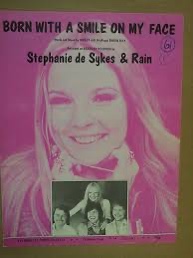
But the influence of Crossroads was clear when the song the fictional Holly Brown had taken to Number One in the show was actually released. It went to Number Two. Written by Simon May who also wrote the theme to Eastenders (wonder if he gets a royalty every time it’s played?) and Howard’s Way, it’s a formulaic and quite irritating song but certainly hit the spot with Crossroads viewers.
And talking about that bloated, aggrandised, self-conscious wedding between Meg and second husband Hugh Mortimer, who shortly afterwards really was murdered by a group of international terrorists that included Dishy David Hunter’s anarchist son Chris and his sultry French girlfriend Simone, which must have caused a slightly strained atmosphere in Monday morning management meetings, Crossroads really had become more than a little bit up its own backdrop. Not only was this wedding publicised as if it was real, it took place at Birmingham Cathedral, TV Times issued a Crossroads Wedding Special edition, thousands of ‘well-wishers’ turned up for the ceremony and their wedding car was driven by a chauffeur who looked alarmingly like Nolly’s great pal Larry Grayson, who at one point, turned and winked archly to the camera. Just before the ceremony Meg was even interviewed by tabloid journalist Godfrey Winn. Not bad for the manageress of a small motel located slightly south of Droitwich, even if it did have a swimming pool. It wasn’t, however, the first time the fourth wall was unceremoniously smashed to smithereens. On a number of occasions at Christmas Meg would summon the staff to her sanctum for a small sherry and, gathered lovingly around her, they would all look directly into the camera, raise their glasses to the viewing public and wish them a ‘Happy Christmas’. If it had been written by Harold Pinter maybe they could have got away with this, but it really wasn’t. And it was this blurring of fiction and reality that, I believe, was at the centre of Meg/Noele’s demise. It was as if she, Noele Gordon, was the star of the wedding, not Meg Richardson and those thousands of saddoes who lined the Birmingham streets were there to see Nolly. And, of course, they were.
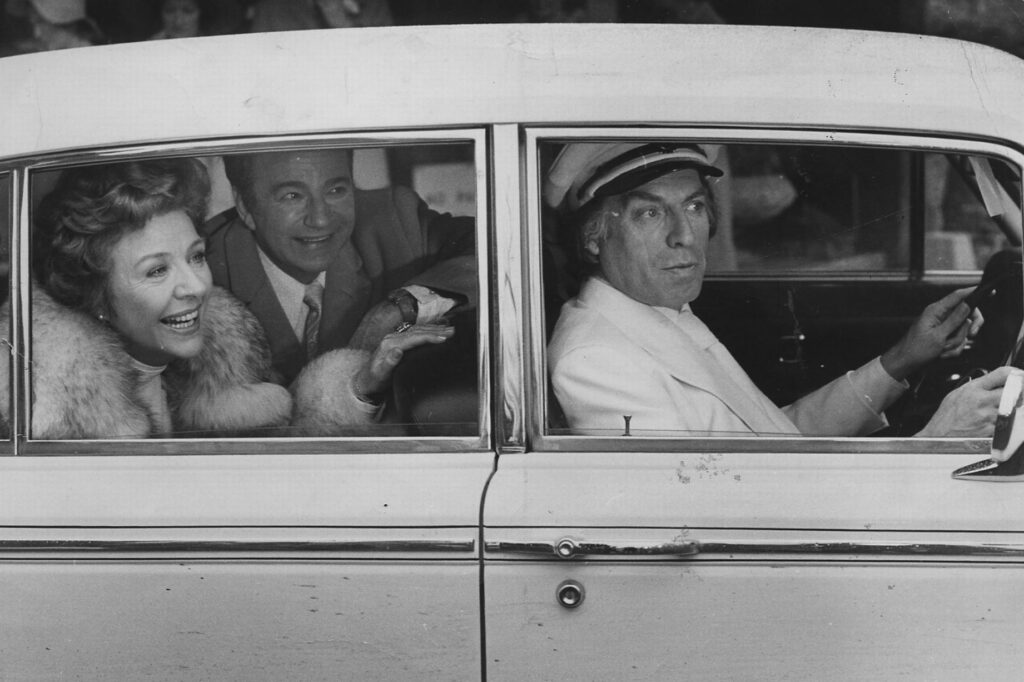
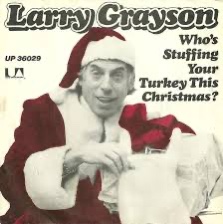
Reading interviews with former Crossroads actors it’s easy to see who ruled the roost in this long-running production. One actor talked about the Green Room where all the regulars had their own chairs and in the centre was Nolly’s throne and, if lucky enough, they’d be allowed to touch the hem of her garment. And this eventually proved too much for the executives at ATV who balked at the negative criticism the show always attracted. A school of thought believes that Noele was strategically sacked in an attempt to let the show wither on the vine. Which is exactly what happened. Eventually.
While at primary school in the 60s we had a very affected old music teacher who delivered her last music lesson to us before retirement. ‘Will you ever come back, Mrs Caldwell?’ giggled an old pal of mine as she made her way to the door. Slowly and without breaking stride, looking straight ahead, she replied in the loviest of manners, ‘Some day….some day…’ And lo she was gone.
And this is how I envisaged Nolly’s departure from Crossroads although in an altogether less benign way. She quickly did the rounds of lunchtime chat shows (Pebble Mill, Harty, Titchmarsh) bemoaning the brutal manner she was unceremoniously dumped after all she’d done for them and she even released a record of such melodramatic magnitude it literally has to be seen and heard to be believed. Was she going quietly? Was she hell!
The double A-side single she released were the songs ‘Goodbye‘ and ‘After All That Time‘ which she was only too happy to perform, with feeling, in front the soup-slurping lunchtime audience. No reference to her perceived savage treatment at the hands of those bastards at ATV then?
But if you want the pure essence of the Matriarch of the Motel, the Queen Bee of Crossroads, the Cleopatra of King’s Oak, and ultimately the Doyenne of Dignity, I urge you to watch the video below.
It may have become quickly rather obvious that I loved Crossroads but, in my pathetic defence, my critical faculties at that age had, of course, yet to be developed. I remember vividly rushing home from school to get in for 4.30pm to soak up the latest emotionally wrought episode. And just hearing that signature tune still makes me feel quite excited and not a little bit nostalgic. If someone gave a me boxed set of 3000 episodes, I’d gladly spend a month self-isolating in a darkened room watching them. And then another month recovering.
Rather pretentiously, not new to this little blogspace, I’m reminded of the (slightly amended) words of Percy Bysshe Shelley:
My name is Ozymandias, Queen of Queens;
Look on my Works, ye Mighty, and despair!
Nothing beside remains. Round the decay
Of that colossal Wreck, boundless and bare
The lone and level sands stretch far away.”
But it did have a swimming pool.
